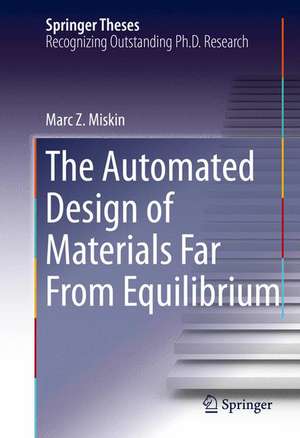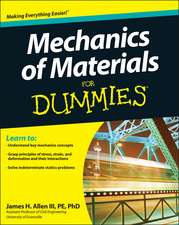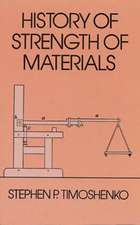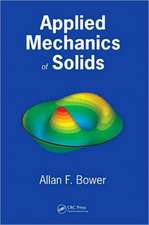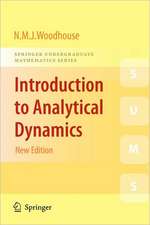The Automated Design of Materials Far From Equilibrium: Springer Theses
Autor Marc Z. Miskinen Limba Engleză Hardback – 23 noi 2015
| Toate formatele și edițiile | Preț | Express |
|---|---|---|
| Paperback (1) | 631.40 lei 6-8 săpt. | |
| Springer International Publishing – 23 aug 2016 | 631.40 lei 6-8 săpt. | |
| Hardback (1) | 637.46 lei 6-8 săpt. | |
| Springer International Publishing – 23 noi 2015 | 637.46 lei 6-8 săpt. |
Din seria Springer Theses
- 18%
 Preț: 997.88 lei
Preț: 997.88 lei -
 Preț: 389.88 lei
Preț: 389.88 lei - 15%
 Preț: 646.94 lei
Preț: 646.94 lei - 18%
 Preț: 943.43 lei
Preț: 943.43 lei -
 Preț: 399.29 lei
Preț: 399.29 lei - 18%
 Preț: 944.99 lei
Preț: 944.99 lei - 15%
 Preț: 636.80 lei
Preț: 636.80 lei - 18%
 Preț: 941.05 lei
Preț: 941.05 lei - 15%
 Preț: 643.16 lei
Preț: 643.16 lei - 15%
 Preț: 642.68 lei
Preț: 642.68 lei - 18%
 Preț: 1103.62 lei
Preț: 1103.62 lei - 20%
 Preț: 558.83 lei
Preț: 558.83 lei - 18%
 Preț: 1112.30 lei
Preț: 1112.30 lei - 18%
 Preț: 944.19 lei
Preț: 944.19 lei - 18%
 Preț: 1109.92 lei
Preț: 1109.92 lei - 18%
 Preț: 1217.27 lei
Preț: 1217.27 lei - 15%
 Preț: 640.06 lei
Preț: 640.06 lei - 15%
 Preț: 636.45 lei
Preț: 636.45 lei - 15%
 Preț: 640.06 lei
Preț: 640.06 lei - 15%
 Preț: 640.88 lei
Preț: 640.88 lei -
 Preț: 389.70 lei
Preț: 389.70 lei - 20%
 Preț: 563.91 lei
Preț: 563.91 lei -
 Preț: 393.35 lei
Preț: 393.35 lei - 15%
 Preț: 637.93 lei
Preț: 637.93 lei - 15%
 Preț: 641.85 lei
Preț: 641.85 lei - 18%
 Preț: 1225.94 lei
Preț: 1225.94 lei - 20%
 Preț: 551.36 lei
Preț: 551.36 lei - 18%
 Preț: 1229.10 lei
Preț: 1229.10 lei - 15%
 Preț: 639.25 lei
Preț: 639.25 lei - 18%
 Preț: 999.45 lei
Preț: 999.45 lei - 15%
 Preț: 640.06 lei
Preț: 640.06 lei - 18%
 Preț: 1220.45 lei
Preț: 1220.45 lei - 18%
 Preț: 1116.26 lei
Preț: 1116.26 lei - 18%
 Preț: 1110.72 lei
Preț: 1110.72 lei - 18%
 Preț: 1000.87 lei
Preț: 1000.87 lei - 18%
 Preț: 891.17 lei
Preț: 891.17 lei - 15%
 Preț: 640.06 lei
Preț: 640.06 lei - 5%
 Preț: 1154.07 lei
Preț: 1154.07 lei - 15%
 Preț: 635.96 lei
Preț: 635.96 lei - 15%
 Preț: 640.88 lei
Preț: 640.88 lei -
 Preț: 387.20 lei
Preț: 387.20 lei - 18%
 Preț: 1109.92 lei
Preț: 1109.92 lei -
 Preț: 385.25 lei
Preț: 385.25 lei -
 Preț: 385.25 lei
Preț: 385.25 lei - 18%
 Preț: 1112.30 lei
Preț: 1112.30 lei - 18%
 Preț: 999.45 lei
Preț: 999.45 lei -
 Preț: 386.99 lei
Preț: 386.99 lei - 15%
 Preț: 637.13 lei
Preț: 637.13 lei - 20%
 Preț: 554.21 lei
Preț: 554.21 lei - 20%
 Preț: 555.59 lei
Preț: 555.59 lei
Preț: 637.46 lei
Preț vechi: 749.95 lei
-15% Nou
Puncte Express: 956
Preț estimativ în valută:
121.98€ • 130.44$ • 101.70£
121.98€ • 130.44$ • 101.70£
Carte tipărită la comandă
Livrare economică 18 aprilie-02 mai
Preluare comenzi: 021 569.72.76
Specificații
ISBN-13: 9783319246192
ISBN-10: 3319246194
Pagini: 89
Ilustrații: XIX, 89 p. 39 illus., 7 illus. in color.
Dimensiuni: 155 x 235 x 12 mm
Greutate: 0.34 kg
Ediția:1st ed. 2016
Editura: Springer International Publishing
Colecția Springer
Seria Springer Theses
Locul publicării:Cham, Switzerland
ISBN-10: 3319246194
Pagini: 89
Ilustrații: XIX, 89 p. 39 illus., 7 illus. in color.
Dimensiuni: 155 x 235 x 12 mm
Greutate: 0.34 kg
Ediția:1st ed. 2016
Editura: Springer International Publishing
Colecția Springer
Seria Springer Theses
Locul publicării:Cham, Switzerland
Public țintă
ResearchCuprins
Introduction.- Artificial Evolution.- Optimization.- Inverse Problems.- Transition of Designs.- Online Design.- Conclusions.
Textul de pe ultima copertă
This thesis conceptualizes and implements a new framework for designing materials that are far from equilibrium. Starting with state-of-the-art optimization engines, it describes an automated system that makes use of simulations and 3D printing to find the material that best performs a user-specified goal. Identifying which microscopic features produce a desired macroscopic behavior is a problem at the forefront of materials science. This task is materials design, and within it, new goals and challenges have emerged from tailoring the response of materials far from equilibrium. These materials hold promising properties such as robustness, high strength, and self-healing. Yet without a general theory to predict how these properties emerge, designing and controlling them presents a complex and important problem. As proof of concept, the thesis shows how to design the behavior of granular materials, i.e., collections of athermal, macroscopic identical objects, by identifying the particle shapes that form the stiffest, softest, densest, loosest, most dissipative and strain-stiffening aggregates. More generally, the thesis shows how these results serve as prototypes for problems at the heart of materials design, and advocates the perspective that machines are the key to turning complex material forms into new material functions.
Caracteristici
Awarded the 2014 James Franck Institute for Best PhD Thesis Presentation and the 2013 Grainger Fellowship, awarded annually to the top experimentalist graduate student at the University of Chicago Offers a new framework for the design of materials far from equilibrium Presents an automated materials design system using simulations and 3D printing Includes supplementary material: sn.pub/extras
